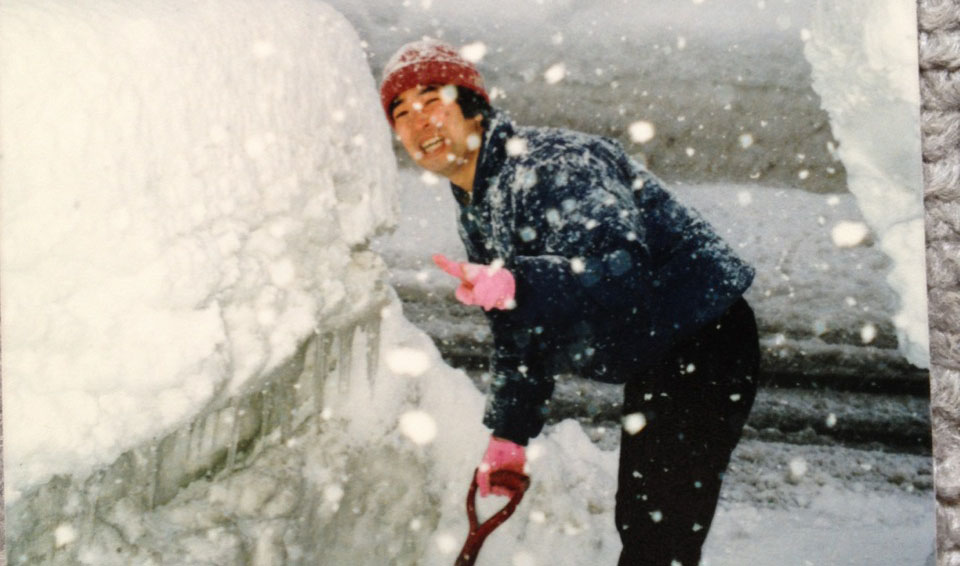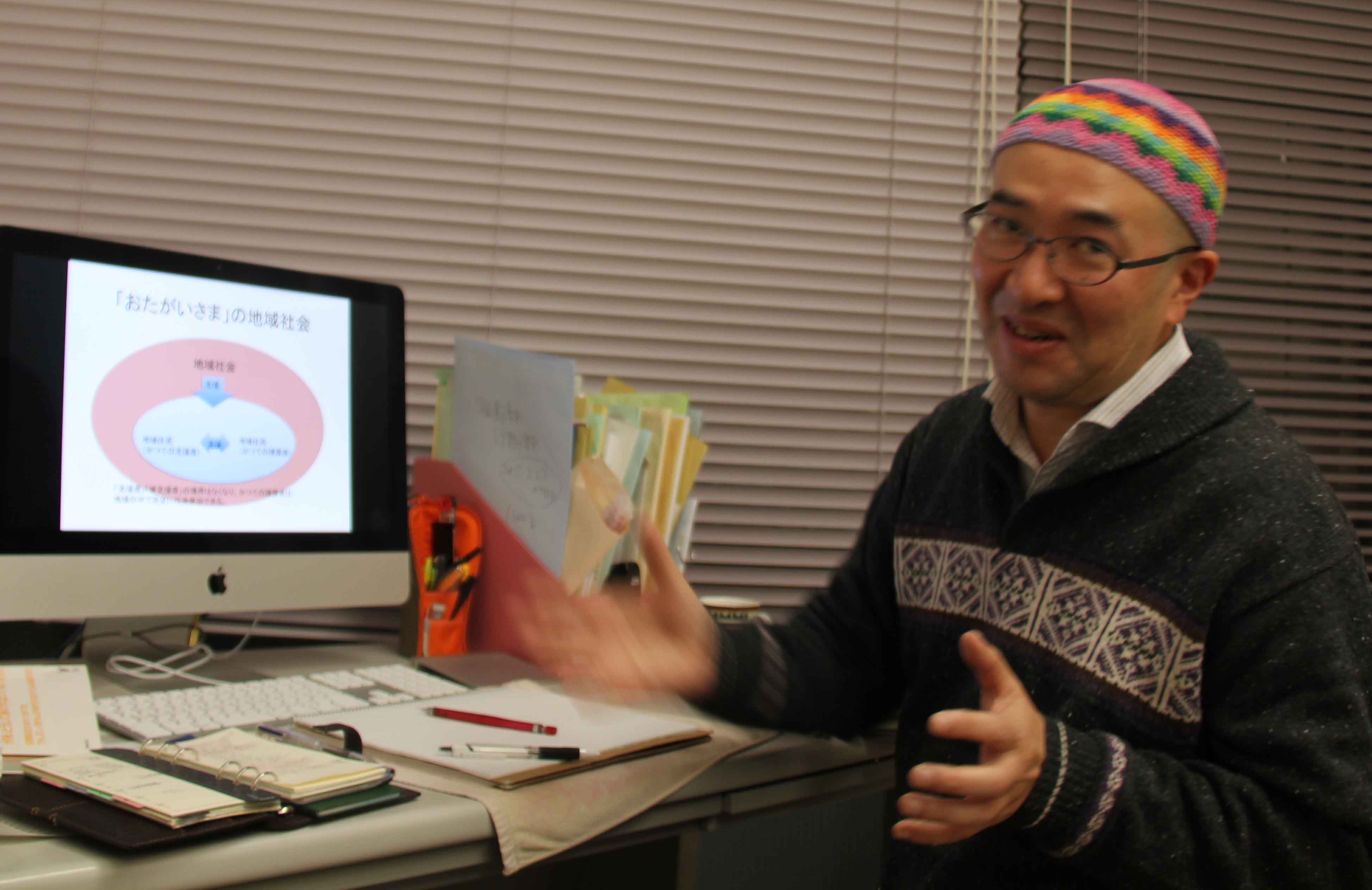TSUKUBA FUTURE
#034 Building Supportive Communities of Mutual Respect and Consideration
Associate Professor SHIOKAWA Hirosato,Faculty of Human Sciences

Prof. Shiokawa's background is quite unique. Before his many endeavors began, he was a pediatrician. He worked at a clinic in a remote part of Japan, then in pediatrics at a university hospital, then as an Embassy medical officer in East Timor. He was the medical officer of a juvenile detention center and a doctor in the disaster zone after the Great East Japan Earthquake. His activities extend to situations that challenge the traditional image of a hospital physician.
In East Timor he worked with children suffering from psychological problems stemming from being raised in a war zone. At the juvenile detention center he worked with children who grew up with developmental disorders and studied their family backgrounds. Whatever the circumstances, Prof. Shiokawa has maintained a consistent interest in helping children with their emotional and mental development. In particular he has focused on the correlations between the family and social environment and children's mental and physical development. Currently he is engaged in research studying how to assist people who have developmental disorders and the people who support them.

Shoveling snow as a rural physician at a clinic in Kaneyama, Fukushima Prefecture (February 1991)
In every community, persons with developmental disorders will always constitute a certain percentage of the population. Prof. Shiokawa's particular focus is on individuals who are not intellectually challenged but who take words of flattery or sarcasm at face value and are unable to read others' emotional intent or the mood of a conversation. They are therefore unable to communicate properly or get along well with others in society. As this disability differs from blindness, deafness, or limb impairment, people around them tend not to be aware of the disability, and those with disorders are often bullied or treated cruelly, verbally taunted or berated. More often than not they do not know how to ask for help even when having difficulties.
When a person with a developmental disorder commits a crime, rather than emphasizing the developmental disorder and seeing it as a direct cause of the act, it is more appropriate to recognize how various background psychosocial factors have affected the person and resulted in the extreme act of committing a crime. If a person's communication can be improved, their relationship to society may change and any problematic behavior may disappear. Communication involves effort from both sides, however.
While practice is needed on the individual's part to improve communication abilities, at the same time a deeper level of understanding is also vital on the part of the people with whom they have contact, not to mention the existence of community systems for appropriate acceptance and support. Prof. Shiokawa has brought such things to people's attention as he works with supporters and communities. His aim is to find a methodology that allows entire regions to embrace people with developmental disorders as part of "supportive community building" efforts.
In East Timor at a local elementary school, teaching students how to brush their teeth (March 2009)
To lead the way, Prof. Shiokawa has begun programs to empower people to use regional support resources. One program supports children at preschools and nursery schools. At the preschool age, children are already displaying varying degrees of development and it becomes difficult to provide the necessary care within a group of other children. Moreover, support systems are still in their infancy.
In fact, when Prof. Shiokawa held seminars at nursery schools and preschools he found that the childcare workers faced many kinds of difficulties and used trial and error to deal with problems. He also found that there was little communication from one childcare facility to another and the knowledge and experience gained at one facility was not being shared or properly utilized. This lack of sharing applies equally to general child rearing. If information is collected and distributed using the Internet and other means, community support resources could become much more substantial.
Prof. Shiokawa therefore set about to build such a system. In parallel, he has worked to provide feedback to people working in the field, offering information on medical education, community care, and the latest medical treatments. He has had the foresight, additionally, to collaborate with experts in different fields such as urban development.
Helping out at a clinic in the tsunami-devastated town of Minamisanriku, Miyagi Prefecture (April 2011)
Prof. Shiokawa still provides medical care to children as a pediatrician. Yet for developmental disorders he feels that little can be done from a medical standpoint. Beyond diagnosis, there is not much a doctor can do. Everything depends on training families and communities, and on the care that they can provide. Although a great deal of research is being done in neuroscience and genetics, it will take years before the results can be applied in real-world medical care.
The important thing, then, was to provide support outside of the medical setting to persons with disabilities and the people who support them, because when people who have a disorder are accepted into the community and are able to contribute to the community, no longer does their disorder pose a problem. The goal is to build support systems into communities such that there is no distinction between supporter and supported. That is when you truly have a society that embodies mutual respect and consideration.
The ultimate goal is to build this supportive sense of community everywhere, wherein people throughout an area understand people with disabilities?not only in educational, medical and medical training facilities, but in shopping arcades and other public locations. People everywhere will not only be understanding, but they will also be able to share and utilize information so that eventually everyone becomes a supporter.

The goal is to create supportive communities and expand mutual respect and consideration throughout society
Article by Science Communicator at the Office of Public Relations


